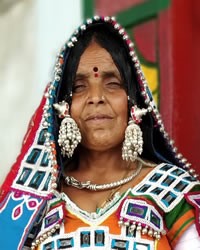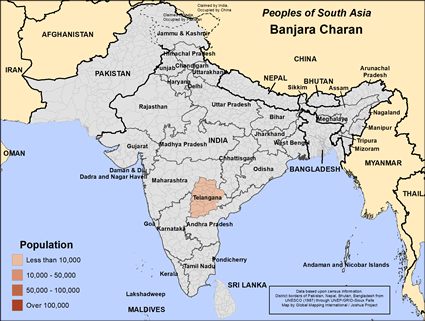The Banjara are the largest nomadic group in India, and they are also known as the Romani. The Romani began traveling from India to different regions of Europe hundreds of years ago, and they eventually developed different dialects depending on the region where they settled. The Banjara's name is derived from the word bajika, which means trade or business, and from banji, meaning peddlers pack. Many consider them descended from Jews who were exiled to Egypt, as they came to India from Egypt and Persia. Some believe they were expelled from their homeland by Muslim invaders.
Banjaras have a couple of subgroups such as the Chara Banjaras. Chara Banjaras only live in India's state of Telangana. Other Banjara peoples are located in over 50 percent of the districts of India.
Most Charan Banjara have olive skin, dark hair and brown eyes. Although we usually associate these groups with bands of fortune tellers traveling in colorful caravans from place to place, this is no longer the case with the Charan Banjara. Historically they were nomadic and kept cattle, traded salt, and transported goods. Now, most of them have settled down to farming and raising cattle or grain. Others still trade in salt and other commodities. In some regions, a few hold white collar positions or work as government servants. They also sew intricately embroidered colorful clothes with shining discs and beads. They make ornaments and ornate jewelry, worn by the women. Married women wear ivory armbands.
Not only do the Charan Banjara usually have more than one occupation, but they also use additional skills to supplement their incomes, depending on the needs at the time. Some specialize in making items such as broomsticks, iron tools and needles. They may also repair tools or work with stone. Others believe that one does not have to work for a living and gain income by "religious begging." They sing and wear special make-up while begging in the name of a specific deity. The Banjara love music, playing folk instruments, and dancing. The Banjar are also acrobats, magicians, tricksters, story-tellers and fortune-tellers.
Because they are poor, they eat what they have grown in their gardens along with dairy products. Many live in grass huts, often with extended families. The Banjara families are closely knit, having minimal relationships with other communities. The role of leader of the community is passed down to the leader's son. All biological sons get an equal share from parental property. Marriages may be arranged, especially to avoid the union of relatives to three generations back. In some groups, however, cousins are allowed to marry.
The majority of the Charan Banjara are Hindu; some have combined Hindu practices with their own animistic beliefs. Charan Banjaras often follow folk beliefs and mixed with these religious beliefs are many taboos (things one must never do.) One taboo is that a woman should not pass in front of a man who is sitting, but rather behind him. Despite their reputation, many have high moral standards. For example, chastity is very important. Unmarried girls are still discouraged from going into the cities, and they usually wear veils over their hands and feet while sitting with strangers.
Many Charan Banjara live in poverty. Usually the only clothes a Banjara owns are the ones on his back. An unsanitary lifestyle has created many physical needs among them. Most children do not attend schools because their families are always on the move. The Banjara do not have a written language, so depending on whatever state of India they are in, if they read, it must be in that states' script.
Pray for Charan Banjara disciples to make more disciples, blessing their entire community with the fragrance of Christ.
Pray for God's blessing, strengthening and healing of Charan Banjara families and communities through the abundant life Jesus offers to all who call on his name.
Pray for God's blessing on Charan Banjara leaders, along with their families, and for their communities to welcome and enjoy God's blessing.
Pray for the Lord to multiply the reception and influence of his word among the Charan Banjara people in India, leading them to love Him with their whole being.
Scripture Prayers for the Banjara Charan in India.
https://joshuaproject.net/people_groups/16315/IN
https://www.facebook.com/charan.banjara
| Profile Source: Joshua Project |











